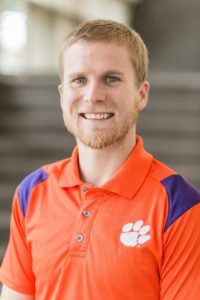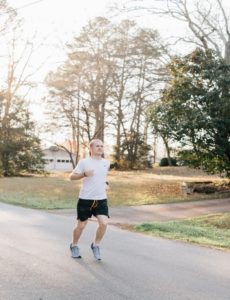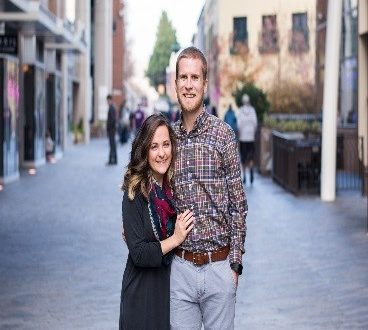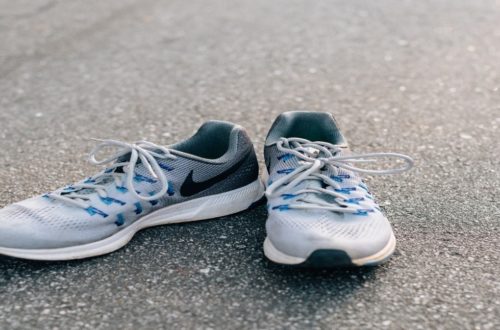What do Al Capone and John Dillinger, running, Clemson University, and the U.S. Naval Academy all have in common? Well, they are all directly connected to Industrial Engineering PhD candidate Rob Curry. Curry, who is always on the run (pun intended) it seems, took a few minutes out of his busy schedule to discuss his hometown, his research, philanthropy, and how Clemson University’s Industrial Engineering program prepared him for the US Naval Academy and beyond.

Hi, Rob! So tell me, where are you from?
RC: I’m from Hot Springs, AR; it’s in central Arkansas.
I’m very familiar with Hot Springs. It’s a great place. Speaking of which, every town has a story, so what is something interesting about Hot Springs that we might not know?
RC: Ok, so during the 1920s and 30s, Hot Springs was a safe haven for organized crime, you know, the mafia. John Dillinger and Al Capone owned houses there, and they could all be there at once. It was a safe place for them.
Oh, WOW!
RC: No crime happened, and there were underground casinos. During prohibition, there were speakeasies and stuff like that as well. It was really interesting. Also, it’s called Hot Springs because there are actually hot springs. Most of the Native Americans in that area thought the springs had magic powers for healing, and bath houses and places like that use the springs for massages as well.

That’s cool. Is Hot Springs where you started running?
RC: I started running in college. I did an internship in Saint Louis one summer, and I didn’t know anybody. Plus, I realized I probably needed to lose a little bit of weight [Laughter], so I just started running in the evenings because I didn’t have anything else to do, and fell in love with it. Now for me, running is a point of stress relief because I can be alone by myself and think, pray, meditate or whatever as I’m running. I can barely go a few days without running.
I only run if something is chasing me [Laughter], but a lot of people I know who run say it’s almost like a drug; it’s like something they have to do.
RC: Right. I agree with those people. I really can’t describe it. The first mile I feel miserable, but after that, I’m like, just zoned out, and yeah, it’s pretty much like a drug. My wife can tell a difference when I haven’t run. She says I can be irritable. [Laughter] But for me, it’s relaxing and calming, so when I have stressful days at work, I go for a run, and that’s kind of how i like to end the day.
That is great. You mentioned college. Where did you go to undergrad, and how did you end up at Clemson?
RC: I did my undergrad at the University of Arkansas. I was working on my PhD at the University of Florida, with Cole (Dr. Cole Smith, Industrial Engineering Professor and Chair), and when he came to Clemson to be the Department Chair, I came with him.
Why did you choose engineering?
RC: I grew up enjoying math as a kid, and enjoyed solving problems, so engineering just made sense. The job market is good for engineering right now, so that was appealing, but the idea of solving problems and using math to do it was really of interest to me.
Tell me a little bit about your research.
RC: Essentially, we’re using math to be able to model large problems or decisions, I would say. So, the problems we’re looking at are generic ones, like if you were trying to move some sort of information or goods from one location to another, and then maybe physically there were roads in between point A and point B that had to connect through some other points in between. If we’re trying to get as much from A to B, for example move goods from Clemson, let’s say to Greenville, we could all use 85 or 123 or whatever other roads might be available. But, if we had to only travel through Easley or Pendleton or wherever else, we would need to determine how much we could get from A to B, knowing that we could only send a certain number of goods on each of these roads. It’s making decisions like that and being able to translate these real world problems into mathematics, oftentimes using computers, or computer science to model these problems and solve them.
That was a great explanation because I know nothing about your research, but I got it. Using the example of 85 was a great way to explain it. So, kudos. Now, when did you know you had the talent to be a researcher, or do you know?
RC: I don’t know. The way you ever really know research is so fluid, and I’ll answer your question, but research is so fluid that there are days where I’m like, oh yeah, I know exactly what I’m doing, and there are days where I have no idea what I’m doing. [Laughter] So it goes back and forth because I think that’s why research is research. We’re trying to push the boundaries of knowledge in some sense, so we’re going to struggle. Oftentimes, I think any distinguished professor or a graduate student like myself would probably say the same thing, but I realized that I enjoyed it. I started doing research as an undergraduate student at the University of Arkansas, and I realized it was fun. My research takes some of the foundational ideas and strategies that we’ve learned in our coursework and applies them to problems that have never been solved. Being able to gain, or to push the boundaries of knowledge, sounds really pretentious, but to solve problems that have never been solved is amazing. I don’t want to work on research that’s not impactful, so hopefully solving those problems for people will make a positive difference in their lives. I don’t work in the same area of research as I did at the University of Arkansas, but I just realized I love the process of working in research, and so that’s what led me to go to graduate school at Clemson.

Fantastic! I heard that you accepted a job as an assistant professor at the US Naval Academy. That’s exciting. Do you have a military background, and in addition to the research, what excites you the most about your new job?
RC: It is exciting. Yeah, I’m excited. And no, I don’t have any military experience. At the Naval Academy 50% are military professors, and 50% are civilian professors, so many professors, and the vast majority of the civilian professors, have no military experience. I was specifically interested in the Naval Academy from the beginning because of the balance of teaching and research. There’s obviously a huge push within public universities toward more research and more funding toward research, which can be a great thing; however, the Naval Academy pushes teaching, which is valuable. They care about high quality teaching, not necessarily that other universities don’t, but the Naval Academy does especially. So, I wanted to be at a place for teaching because I love to teach, and I knew that was the case there. It’s actually a math department, so the type of research that I work in can be in engineering schools, and it can also be in business schools because it’s kind of at this intersection. It’s called operations research.
That was my next question.
RC: It’s called operations research, but that’s just a very general term because it’s essentially this idea of using math to model problems and actually solve them. Operations research is kind of at the intersection of engineering, mathematics and computer science. So, my research itself won’t look any different there as it would if I stayed here and went to an engineering school. I would teach slightly different courses, but not drastically different.

Switching gears, what are some of the ways that you’ve tried to support and integrate with the grad students here?
RC: That’s a great question. I think, especially given that our field is so international, oftentimes a graduate student steps on campus in Clemson, and they’ve been in the United States for the first time ever, for two weeks. So, Dr. Cole will send me an email and say, “Hey, so and so’s coming from Turkey; they’ve never been to the US. Any way you can help them out?” For me it’s trying to connect a lot of the international students, making their transition from where they are to here be as easy as possible, given that I know how things like rent and insurance and healthcare and other things work. I’m trying not to be the point man, but more of someone who people feel open to come and ask questions about grants, or scholarships and things like that. Connecting even means doing things like going to lunch on Fridays together as graduate students. Lunch is $5.00 in the cafeteria, so it’s hard to beat that price.
Yes, it is hard to beat $5. So that’s how you support and integrate with the grad students, but what about the community? Are you doing different things in the community?
RC: So my wife and I are very involved in our church Crosspoint Church, and our church does outreach events. There are some programs in our church that do English as a Second Language for international students, and then my wife is on a board for a nonprofit that raises awareness for domestic minor sex trafficking, and I’ve been able to try to help. I’ve been able to help her more by supporting her in that group and trying to understand and learn about what’s going on myself. I’ve helped her with a couple of small conferences they’ve had in Greenville and stuff like that as well.
Now that is truly wonderful work that is being done in the community. Thank you for sharing that. Ok, so here’s my last question. We’ve talked about your hometown, running, the Naval Academy, and your research. What would you say to someone who’s thinking about coming to Clemson for the program that you’re in? What would you say to them about your experience?
RC: First, the faculty are very open and welcoming, and they will help you to do whatever you need them to do. If you have any kind of questions, just ask because no question is a dumb question. As graduate students and PhD students, you get to know these people as more than just professors. I run with them. My wife and I have baby sat Cole’s kids a few times as well. So getting to know them outside of the department makes the working relationship even better. From the faculty perspective, they’re great; they’re brilliant people, so getting to work with them is an honor in a sense, and it is good for me professionally to grow my own technical skills. The university and the community itself are great places. People are open to having discussions about anything, and I can sit down with someone who is not like me and have a conversation. I can learn from them because either they believe something different, or they have a different experience than me. I love that even though Clemson is a large school, the size of the town is beneficial for graduate students. You can get anywhere in Clemson in 10 to 15 minutes. It’s just 45 minutes to Greenville, which is nice, and you can get do a lot of things there. I think, within our program specifically, there is a growing sense of community. It’s a fun, dynamic environment to work in as long as you’re willing to contribute to that.

If you’d like to learn more about the faculty, staff, and students in the Department of Industrial Engineering at Clemson, you may do so by using the contact information below.
Dr. Cole Smith (Chair), Department of Industrial Engineering
100-B Freeman Hall, Clemson University
Clemson, SC 29634-0920
Phone: (864) 656-4716
Fax: (864) 656-0795
Email: jcsmith@clemson.edu
GEVERYL ROBINSON
Baltimore native, Geveryl Robinson, is an educator, author, and former columnist for the Savannah Morning News. Her columns and musings have been mentioned or featured in The Washington Post, The New York Times, the Dallas Morning News, More magazine, the Knoxville News Sentinel, FOX News, the Shorty Award winning Historically Black Podcast, The Huffington Post, CNN.com and many other online and print publications. She currently teaches English at Clemson University. Email Geveryl at geveryr@clemson.edu.
